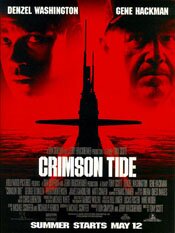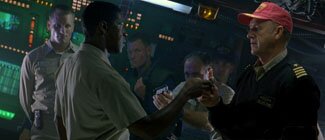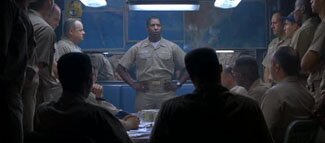 Directed by Tony Scott
Directed by Tony Scott
In the tradition of movies like Run Silent, Run Deep, The Hunt for Red October and Das Boot, the Tony Scott directed Crimson Tide is submarine drama with strong lead characters. If it distinguishes itself from those previous movies it is by being faster moving and much noisier.
That may not sound overly appealing but it be would wrong to think that way. This is a very good, very engaging action-adventure with a strong foundation: the performances of Denzel Washington and Gene Hackman.
It’s also supported by strong performances by its supporting cast – Matt Craven, George Dzundza, Viggo Mortensen and James Gandolfini, to name a few.
Without its strong cast, I think this would likely be just an average film but with them it is firmly anchored.

There is a state civil war in Russia. Rebel generals have taken over a base with nuclear weapons and it appears as if they may use them. The U.S. naval sub Alabama, nuclear-armed, is sent to Asian waters to await instructions. They get them: prepare your missiles. A further message, only partially received, may be orders to fire them or to stand down. It is unclear.
The movie’s conflict is between the sub’s captain (Gene Hackman) and its new executive officer (Denzel Washington). For the missiles to be fired, the two must be in agreement. They aren’t. The captain wants to fire; his second in command does not.

What makes movies like this dramatic and appealing (and you see this in films like Run Silent and Red October) is that the “bad guy” is external – off set. The leads, in this case Hackman and Washington, are both good guys but they are at opposing ends about what to do and thus in conflict.
This increases the film’s conflict by removing the easy, black and white choice and while an audiences’ sympathy may align with one, they can’t easily dismiss the other.
This is also reflected in the unfolding of the film’s drama where the sub’s crew must choose sides, many of whom are conflicted (like Mortensen’s Lt. Ince). We end up with struggles in the submarine, including mutiny, because of the lack of clarity. It’s all due to the ambiguity of the last orders received.
The movie doesn’t ease its audience into the story; it throws them in head first. Music and editing thrum as it begins with a journalist describing events in Russia. There is no slow unfolding of exposition. Director Scott and producer Jerry Bruckheimer take the approach of throwing the audience in at full speed. Details fly by like rapid fire flash cards.

In some movies, this is noise and fury approach can be a gimmick to mask an uninspired story but in Crimson Tide it’s a quick and effective way to get quickly to what is an intelligent, well told story. Perhaps its due to the close quarters of submarines, but movies like this seem to lend themselves to dramatic, character-driven films.
While my own preference is for the quieter tension of a movie like The Hunt for Red October (which I find more effective), it works for Crimson Tide as it delivers a compelling film that leaves an audience with something to question and discuss when is over.
On the whole, this is a very good movie and well worth seeing and more than once.


